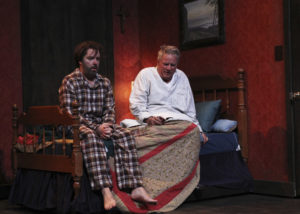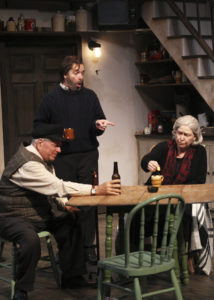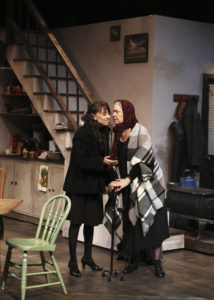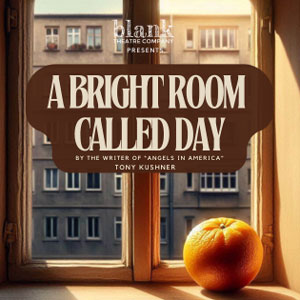
 [rating=4] For fans of a certain Irish dramatic sensibility—gallows humor, spirituality, gloomy weather—there’s no better American author than John Patrick Shanley. The winner of the Pulitzer Prize for Doubt: A Parable, Shanley, now in his late sixties, has regularly churned out dramas in recent years, including 2014’s Outside Mullingar. Much lighter-hearted than Doubt, this story about a slow-rolling romance between people pushing middle age has now arrived at Buffalo Theatre Ensemble in Glen Ellyn under the direction of longtime Chicago director Steve Scott. Bearing his trademark attention to emotional nuance, the production is both sweet and hilarious.
[rating=4] For fans of a certain Irish dramatic sensibility—gallows humor, spirituality, gloomy weather—there’s no better American author than John Patrick Shanley. The winner of the Pulitzer Prize for Doubt: A Parable, Shanley, now in his late sixties, has regularly churned out dramas in recent years, including 2014’s Outside Mullingar. Much lighter-hearted than Doubt, this story about a slow-rolling romance between people pushing middle age has now arrived at Buffalo Theatre Ensemble in Glen Ellyn under the direction of longtime Chicago director Steve Scott. Bearing his trademark attention to emotional nuance, the production is both sweet and hilarious.
The play opens after a funeral. Chris Muldoon, farmer of the impoverished Midlands region, has just passed away, and his neighbors, Tony Reilly (Norm Woodel) and his middle-aged son, Anthony (Robert Jordan Bailey) are berating themselves for inviting his family over for tea. They don’t have anything against Aoife (Millie Hurley) or her daughter, Rosemary (Kelli Walker), but they’d had a very long-running petty land dispute with Chris which is still a source of discomfort. Tony starts the conversation by announcing to Aoife that she looks like she’ll be dead within a year, which she bluntly agrees with but says the same is true of him. Their children soon become the target of their bickering, with Aoife declaring that Rosemary will never achieve her dream of seeing the world beyond Mullingar and Tony deriding Anthony’s aptitude for farming and musing on whether he ought to bequeath their farm to a different relative with Anthony still in the room.
They’re being funny (without much regard for other people’s feelings), but inheritance of the Reilly farm is, in fact, a major sticking point. While the land’s not very desirable as long as the Muldoons own the only access to the road, Anthony feels ineffably tied to it while simultaneously being deeply unhappy with his life. Rosemary is also frustrated. When Anthony asks why, she responds by comparing herself to Swan Lake’s white swan and Anthony’s old high school girlfriend to the black swan, but he completely misses her obvious meaning and they soon get sidetracked by her concern over his depressive state.
As Rosemary, Walker is a commanding presence. It’s totally believable when, full of righteous fury, she marches into Tony’s own house, confronts him, and successfully orders him around. And yet, she’s also a woman who waits for over a year to speak plainly about what she wants. It’s a difficult line to walk, requiring her to be both canny and inexperienced, as well as self-aware about how closely her goals resemble excuses. Bailey as Anthony gives her a to play off, and it is fascinating how director Steve Scott has them transfer energy during their heart-to-hearts. Tony alludes to Anthony having a mental illness from his mother’s family, which everyone chides Tony for saying but clearly agrees with. Anthony clearly yearns for affection but thinks himself unworthy somehow, which gives Rosemary a project, if not much else. Woodel and Hurley as the parents are cantankerous delights. Their comedic timing is perfect but there’s a sense of weight behind it, as if they really don’t regret that they’ll soon be gone.
Shanley’s play, though filled with Chekhov’s guns and other well-made devices, is in large part about what people choose to assign significance to. The characters frequently claim to believe they are being guided by signs from heaven, only to contradict themselves or change their minds about what they are supposed to be doing. Living in the poorest part of Ireland in the wake of the Eurozone crises, they also frequently reference the disappointment of the Celtic Tiger’s downfall and the uncertainty of whether things will ever improve for them. In between the caustic wit, Scott and his cast form the heart of the show by bringing out these moments. Scenic designer Pauline Oleksy and props designer Jesse Gaffney imply a whole lot about the characters of the Reilly and Muldoon families just from what we see of their kitchens, and Christopher Kriz’s sound design eases the audience into a wistful mood without drawing attention to itself. Outside Mullingar is a play that sneaks up on a viewer instead of confronting them. It shows what happens when people are at an age when they realize their possibilities are no longer endless and how they can still pursue happiness in their own way.
One last note: Buffalo Theatre Ensemble’s contract with the College of DuPage was renewed last April, allowing the company to continue residence in the McAninch Arts Center. They recently announced their upcoming season, which includes Defiance, another Shanley play more closely linked thematically to Doubt.
Outside Mullingar plays at the McAninch Arts Center, 425 Fawell Blvd, Glen Ellyn, Illinois, through June 3, with performances as follows:
Fridays: 8:00 pm
Saturdays: 8:00 pm
Sundays: 3:00 pm
Tickets are $37. To order, visit At the Mac or call 630-942-4000.
Running time is one hour and forty-five minutes with one intermission. Parking is available for free in the lot.
To see what others are saying, visit www.theatreinchicago.com, got to “Review Round-Up,” and click Outside Mullingar.







More Stories
Teatro ZinZanni Chicago “Love Chaos and Dinner”.
“A Bright Room Called Day”
“The Totality of All Things” reviewed by Frank Meccia